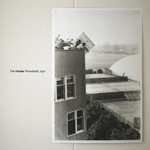|
|
 |
Dusted Reviews
Artist: Tim Hecker Album: Ravedeath, 1972 Label: Kranky Review date: Feb. 14, 2011 |

|
|
|
 |
The analogy of sea waves and sound waves is an ubiquitous one. With Tim Hecker though, it’s a tough one to out-analogize. His music has a submerging quality. Furthermore, perhaps Hecker’s greatest talent is his ability to compose music that laps omni-directional, akin to lying on a shore and letting gentle waves envelope your ears and ebb back with the tide. His albums are never straightforward and rarely predictable. You plug in with the specific goal of washing away.
Ravedeath, 1972 finds Hecker locked in a church in Reykjavik, surely surrounded by the chilly Faxaflói bay. Employing a pipe organ as musical inspiration and the primary sound source, Hecker worked with the Iceland-based musician Ben Frost to further evolve his brand of sensual noise. The organ provides beautifully resonating tones, which Hecker deftly utilizes in a number of ways. They stutter with the staticky intermittence of a decaying Kinetograh during “The Piano Drop.” They’re cased in a metallic sheen, layered and staggered through the three tracks of “In the Fog.” They throb and pulse Gas-like during “No Drums.” And in the closing moments of the “In the Air” movement, they even sound like a hushed choir.
Hecker has backed off the dramatic melodic statements of An Imaginary Country somewhat with Ravedeath. There are still plenty of poignant moments throughout the record, but it’s delivered in a subtler manner; the seemingly tape-manipulated harmonies of “Hatred of Music” make for excellent examples. It may not be an epiphany like 2001’s Haunt Me Haunt Me, Do It Again or 2006’s Harmony in Ultraviolet, but that’s only because Hecker’s back-catalogue is of such remarkably high quality. Simply, we’ve come to expect this of the Canadian producer. While there are an innumerable number of musicians treading similar waters, Hecker somehow remains a step above. Ravedeath does nothing to diminish this reputation, and provides an endless loop of intriguing and mesmerizing postmodern music.
Out of curiosity, I spent some time trying to track down exactly what rave died in 1972, but I could only come up with a few rather speculative associations to this album: an article titled “Mystical States of Consciousness” by E. Gellhorn and W.F. Kiely published that year and cited in a book about rave culture and religion, a 1972 cover of Buddy Holly’s “Rave On” by Gerry & the Joy Band that definitely doesn’t deserve to live on, and a reference to an infamous wedding party (ahem, rave) that left 100 people dead that January after a New Delhi bootlegger hawked them wood alcohol. (Similarly vague leaps of association were found while searching the two tracks titled with specific years as well.) Any of the three would grant the narrative-less album an intriguing back-story and appropriate emotional inspiration, which is of course the charm in Hecker’s music. His inventive and affective pairing of resonating melodies and noise is impossible to deconstruct – that is to say, narrow down to a specified meaning or reason behind each piece. We, the listener, get to apply each of Hecker’s abstractions to whichever feeling we choose. That’s definitely an ocean worth diving into.
By Michael Ardaiolo
|







